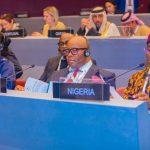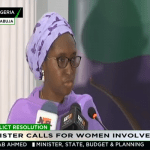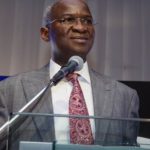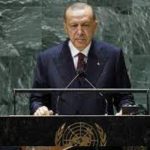The Borno State Government and the United Nations Development Programme has organized a two-day capacity enhancement training for 200 traditional and religious leaders on the reintegration strategy in Maiduguri.
This is part of the “Borno Model” introduced by the state government on transitional Justice.
Borno state is now enjoying relative peace.
Most IDPs are now back to their places of abode and are starting a new life.
But government and humanitarian partners are doing all they can to sustain this development and they have summoned 200 traditional and religious leaders from across 20 local government councils.
It’s a capacity enhancement training on reintegration and early warning conflict strategy.
One of the objectives of this training is to equip traditional and religious leaders on how best to foster peaceful coexistence in their domains.
The training would also focus on importance of using a non-kinetic approach to handle counter-insurgency efforts and to address the humanitarian crises that has lingered for over a decade.
The borno state government and the United Nations development programme believe that this training would boost the capacity of traditional and religious leaders to prevent, respond and address conflicts so as to achieve a peaceful society.
The Borno State Government and the United Nations Development Programme has organized a two-day capacity enhancement training for 200 traditional and religious leaders on the reintegration strategy in Maiduguri.
This is part of the “Borno Model” introduced by the state government on transitional Justice.
Borno state is now enjoying relative peace.
Most IDPs are now back to their places of abode and are starting a new life.
But government and humanitarian partners are doing all they can to sustain this development and they have summoned 200 traditional and religious leaders from across 20 local government councils.
It’s a capacity enhancement training on reintegration and early warning conflict strategy.
One of the objectives of this training is to equip traditional and religious leaders on how best to foster peaceful coexistence in their domains.
The training would also focus on importance of using a non-kinetic approach to handle counter-insurgency efforts and to address the humanitarian crises that has lingered for over a decade.
The borno state government and the United Nations development programme believe that this training would boost the capacity of traditional and religious leaders to prevent, respond and address conflicts so as to achieve a peaceful society.
The Borno State Government and the United Nations Development Programme has organized a two-day capacity enhancement training for 200 traditional and religious leaders on the reintegration strategy in Maiduguri.
This is part of the “Borno Model” introduced by the state government on transitional Justice.
Borno state is now enjoying relative peace.
Most IDPs are now back to their places of abode and are starting a new life.
But government and humanitarian partners are doing all they can to sustain this development and they have summoned 200 traditional and religious leaders from across 20 local government councils.
It’s a capacity enhancement training on reintegration and early warning conflict strategy.
One of the objectives of this training is to equip traditional and religious leaders on how best to foster peaceful coexistence in their domains.
The training would also focus on importance of using a non-kinetic approach to handle counter-insurgency efforts and to address the humanitarian crises that has lingered for over a decade.
The borno state government and the United Nations development programme believe that this training would boost the capacity of traditional and religious leaders to prevent, respond and address conflicts so as to achieve a peaceful society.
The Borno State Government and the United Nations Development Programme has organized a two-day capacity enhancement training for 200 traditional and religious leaders on the reintegration strategy in Maiduguri.
This is part of the “Borno Model” introduced by the state government on transitional Justice.
Borno state is now enjoying relative peace.
Most IDPs are now back to their places of abode and are starting a new life.
But government and humanitarian partners are doing all they can to sustain this development and they have summoned 200 traditional and religious leaders from across 20 local government councils.
It’s a capacity enhancement training on reintegration and early warning conflict strategy.
One of the objectives of this training is to equip traditional and religious leaders on how best to foster peaceful coexistence in their domains.
The training would also focus on importance of using a non-kinetic approach to handle counter-insurgency efforts and to address the humanitarian crises that has lingered for over a decade.
The borno state government and the United Nations development programme believe that this training would boost the capacity of traditional and religious leaders to prevent, respond and address conflicts so as to achieve a peaceful society.
The Borno State Government and the United Nations Development Programme has organized a two-day capacity enhancement training for 200 traditional and religious leaders on the reintegration strategy in Maiduguri.
This is part of the “Borno Model” introduced by the state government on transitional Justice.
Borno state is now enjoying relative peace.
Most IDPs are now back to their places of abode and are starting a new life.
But government and humanitarian partners are doing all they can to sustain this development and they have summoned 200 traditional and religious leaders from across 20 local government councils.
It’s a capacity enhancement training on reintegration and early warning conflict strategy.
One of the objectives of this training is to equip traditional and religious leaders on how best to foster peaceful coexistence in their domains.
The training would also focus on importance of using a non-kinetic approach to handle counter-insurgency efforts and to address the humanitarian crises that has lingered for over a decade.
The borno state government and the United Nations development programme believe that this training would boost the capacity of traditional and religious leaders to prevent, respond and address conflicts so as to achieve a peaceful society.
The Borno State Government and the United Nations Development Programme has organized a two-day capacity enhancement training for 200 traditional and religious leaders on the reintegration strategy in Maiduguri.
This is part of the “Borno Model” introduced by the state government on transitional Justice.
Borno state is now enjoying relative peace.
Most IDPs are now back to their places of abode and are starting a new life.
But government and humanitarian partners are doing all they can to sustain this development and they have summoned 200 traditional and religious leaders from across 20 local government councils.
It’s a capacity enhancement training on reintegration and early warning conflict strategy.
One of the objectives of this training is to equip traditional and religious leaders on how best to foster peaceful coexistence in their domains.
The training would also focus on importance of using a non-kinetic approach to handle counter-insurgency efforts and to address the humanitarian crises that has lingered for over a decade.
The borno state government and the United Nations development programme believe that this training would boost the capacity of traditional and religious leaders to prevent, respond and address conflicts so as to achieve a peaceful society.
The Borno State Government and the United Nations Development Programme has organized a two-day capacity enhancement training for 200 traditional and religious leaders on the reintegration strategy in Maiduguri.
This is part of the “Borno Model” introduced by the state government on transitional Justice.
Borno state is now enjoying relative peace.
Most IDPs are now back to their places of abode and are starting a new life.
But government and humanitarian partners are doing all they can to sustain this development and they have summoned 200 traditional and religious leaders from across 20 local government councils.
It’s a capacity enhancement training on reintegration and early warning conflict strategy.
One of the objectives of this training is to equip traditional and religious leaders on how best to foster peaceful coexistence in their domains.
The training would also focus on importance of using a non-kinetic approach to handle counter-insurgency efforts and to address the humanitarian crises that has lingered for over a decade.
The borno state government and the United Nations development programme believe that this training would boost the capacity of traditional and religious leaders to prevent, respond and address conflicts so as to achieve a peaceful society.
The Borno State Government and the United Nations Development Programme has organized a two-day capacity enhancement training for 200 traditional and religious leaders on the reintegration strategy in Maiduguri.
This is part of the “Borno Model” introduced by the state government on transitional Justice.
Borno state is now enjoying relative peace.
Most IDPs are now back to their places of abode and are starting a new life.
But government and humanitarian partners are doing all they can to sustain this development and they have summoned 200 traditional and religious leaders from across 20 local government councils.
It’s a capacity enhancement training on reintegration and early warning conflict strategy.
One of the objectives of this training is to equip traditional and religious leaders on how best to foster peaceful coexistence in their domains.
The training would also focus on importance of using a non-kinetic approach to handle counter-insurgency efforts and to address the humanitarian crises that has lingered for over a decade.
The borno state government and the United Nations development programme believe that this training would boost the capacity of traditional and religious leaders to prevent, respond and address conflicts so as to achieve a peaceful society.














